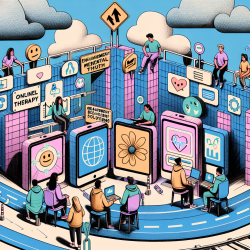Introduction
In today's rapidly evolving digital landscape, the integration of technology into mental health care offers promising avenues for addressing the increasing mental health challenges faced by youth. A recent study titled Perceptions of mental health providers of the barriers and facilitators of using and engaging youth in digital mental-health-enabled measurement based care explores the perceptions of mental health professionals regarding the use of digital mental health (dMH) platforms, specifically measurement-based care (MBC), with youth. This blog aims to highlight key findings from the study and provide actionable insights for practitioners looking to enhance their skills in implementing digital solutions for youth mental health.
Understanding Barriers to Digital Mental Health Implementation
The study identifies several barriers that mental health professionals perceive as obstacles to implementing dMH solutions effectively. These include:
- Cultural Stigma and Family Apprehension: Cultural stigma surrounding mental health and parental apprehension about digital platforms can deter youth from engaging with dMH tools. Professionals must be equipped to address these concerns through education and communication strategies.
- Responsibility and Liability Concerns: Professionals express concerns about the increased responsibility and liability associated with managing youth in crisis through digital platforms. Establishing clear protocols and crisis management strategies is essential.
- Suitability for Certain Disorders: There is skepticism about the effectiveness of dMH for youth with specific psychiatric and neurodevelopmental disorders. Tailored approaches and additional support may be required for these populations.
- Youth Readiness: The readiness and motivation of youth to engage with dMH tools can vary. Practitioners should assess individual readiness and provide support to enhance engagement.
Facilitators for Successful Implementation
Despite the barriers, the study also highlights facilitators that can enhance the adoption of dMH solutions:
- Suitability for Mild Concerns: Youth with mild mental health concerns are seen as ideal candidates for dMH, as these platforms can provide timely support and reduce the burden on traditional services.
- Youth Motivation and Proficiency: Many youth are motivated to track their mental health progress and are proficient with digital tools. Leveraging this motivation can enhance engagement and outcomes.
- Preference for Digital Solutions: Youth often prefer digital interactions, making dMH platforms a natural fit for delivering mental health support.
Recommendations for Practitioners
To effectively implement dMH solutions, practitioners should consider the following recommendations:
- Provide comprehensive training on the use of dMH platforms, including crisis management and engaging diverse families.
- Adopt a collaborative approach with youth, empowering them to make informed decisions about their mental health care.
- Tailor interventions to accommodate diverse psychosocial contexts and cognitive functioning.
- Continuously evaluate and adapt strategies to address emerging barriers and facilitators.
Conclusion
The integration of digital solutions in youth mental health care presents both challenges and opportunities. By understanding and addressing the barriers and facilitators identified in the study, practitioners can enhance their skills and improve outcomes for youth. For those interested in delving deeper into the research, the original paper provides a comprehensive exploration of these themes.
To read the original research paper, please follow this link: Perceptions of mental health providers of the barriers and facilitators of using and engaging youth in digital mental-health-enabled measurement based care.










